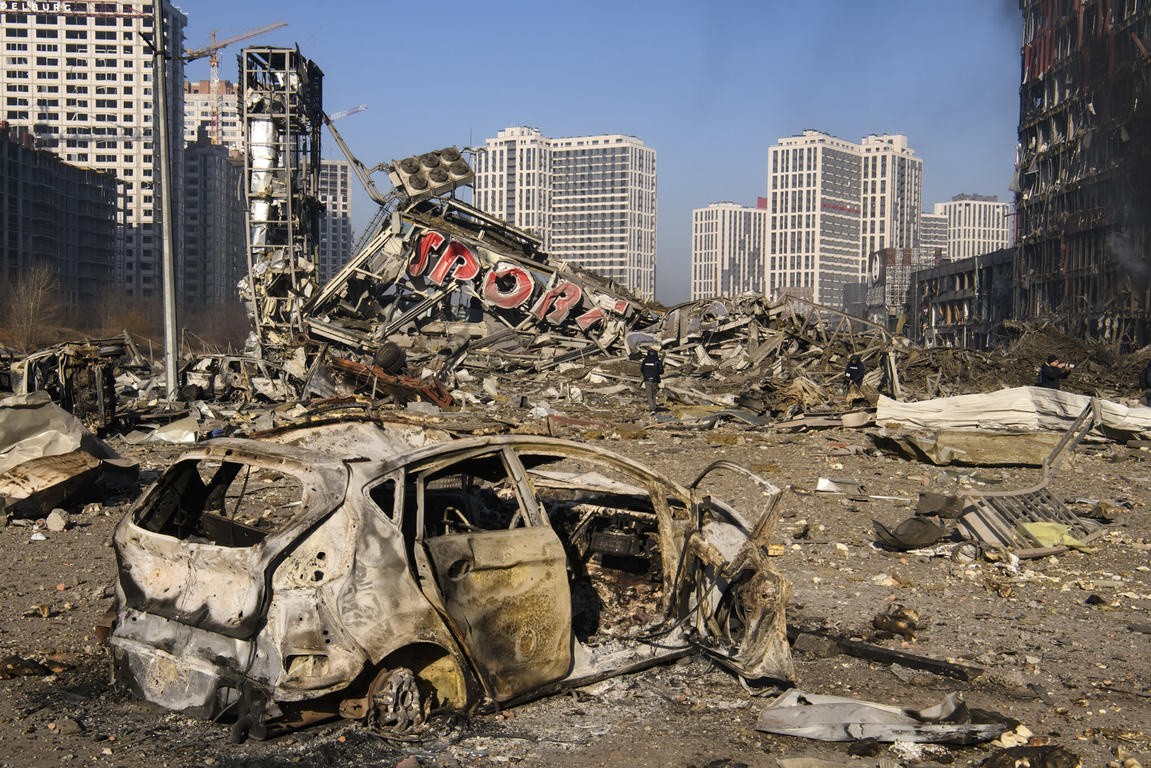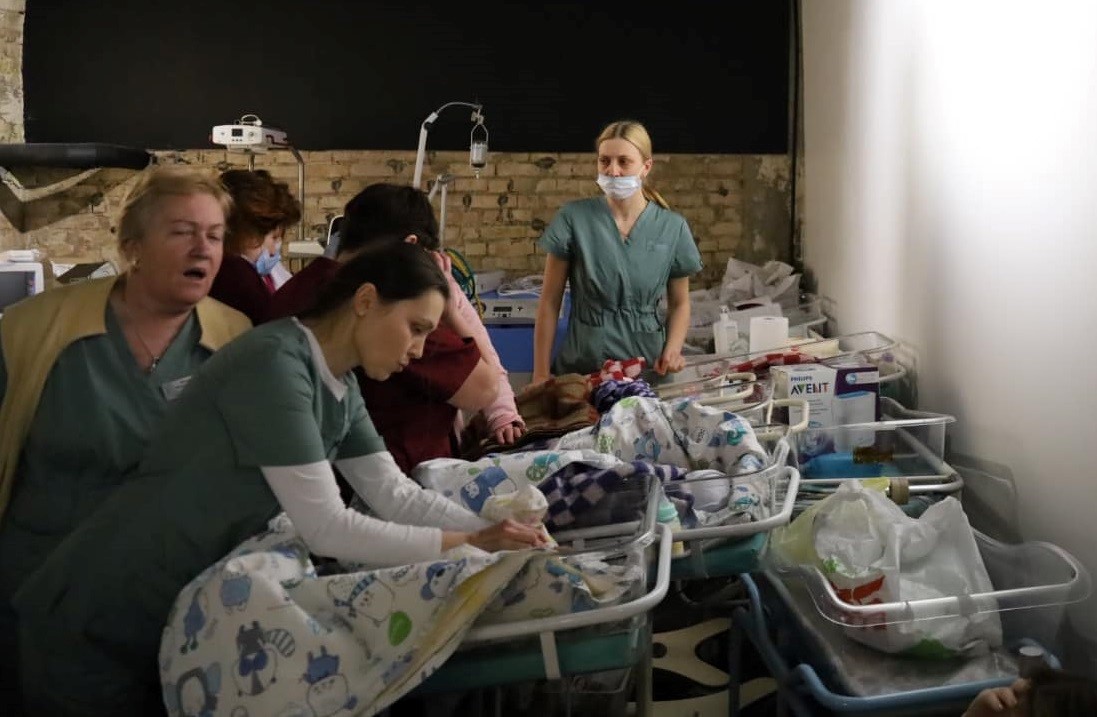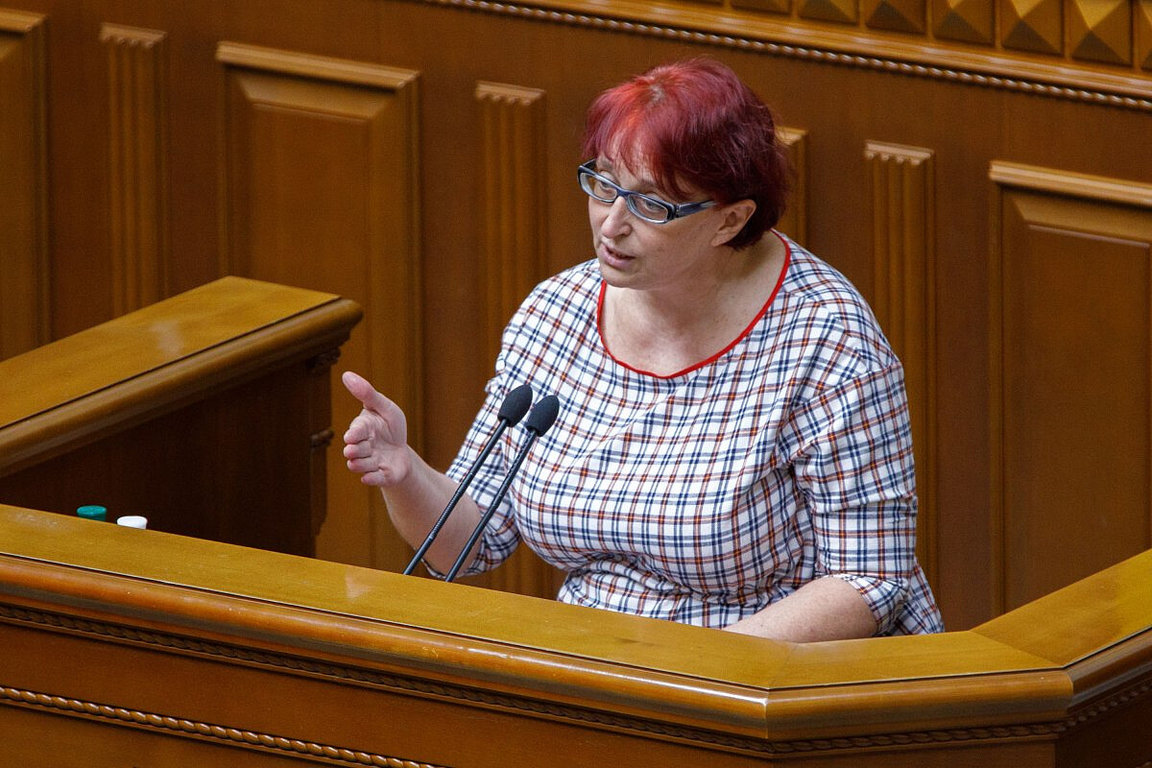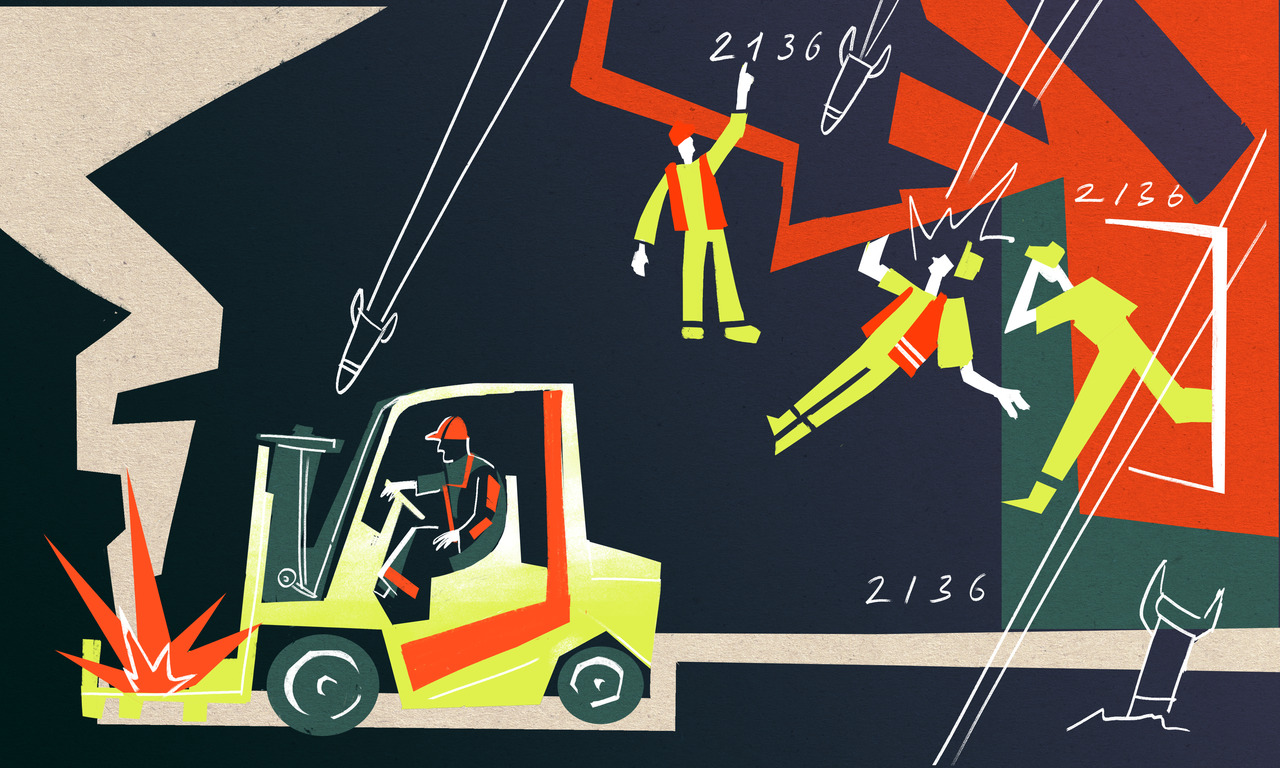After February 24, as Ukraine was showered by deadly Russian missiles, employees faced an unprecedented crisis. Continuing to work became risky in every sense of the word[1]. It was not difficult to predict the reaction of employers to the new challenges. According to business and human rights expert Olena Uvarova, companies put financial survival first.
In the first month of the war alone, 30% of businesses were forced to stop operating, which meant the loss of earnings for millions of people, some even without proper dismissal procedure. It has become more difficult to find a job, as the number of official vacancies has decreased significantly. It is difficult to imagine how wage arrears have increased, as this issue has not been monitored in practice[2].
Given the increase in violations of labor rights, a government course was announced for temporary deregulation of the rules of employment and dismissal, which overcame all of the previous experience in reforming the social and labor sphere. Under these circumstances, employers were allowed to observe only the bare minimum liabilities to employees. Instead of increasing state intervention in the economy[3], it has been effectively self-eliminated.
It seems that such an approach to the regulation of labor relations won’t bring any compromise and economic support, but will give all of the power to the owners. This model did not arise due to a coincidence of emergency factors but follows from the neoliberal ideology of our politicians. Now let’s look at the consequences of these steps for employees during and after martial law.
The loss of balance: How it all began
When every minute could potentially cost a life, governments must make tough decisions in the public interest, in this case — defense from the military invasion. Ensuring social rights during the war is no easy task. War is the worst possible condition for the establishment of high standards for labor rights. The issue of possible deviation from the legal obligations during wars is "programmed" in the system of international labor regulation. The International Labor Organization (ILO), which emerged from the flames of the First World War, has certain regulations regarding the temporary suspension of labor guarantees for workers due to war or other emergencies[4].

A rescue worker helps a woman evacuate from a house destroyed in the shelling in Obolon, Kyiv. / Pavlo Petrov
States can restrict people's rights if it helps protect the country as a whole. Yet, in the long run, it is beneficial for society to maintain decent working conditions. After all, the course of the war depends on whether ordinary people would be fed and would be able to offer donations to the army. A restriction of rights must be approached with extreme caution. What did we see in Ukraine?
Literally from the first days of the invasion, many government officials delivered different statements, saying that it would not be the same as before. This was usually about the immediate need to free employers from the burden of obligations that they no longer seem to be able to fulfill. The Chamber of Commerce and Industry of Ukraine has described Russia's armed aggression as a force majeure that exempts employers from liability for late payment of wages. At the same time, the very right for labor compensation was under threat.
Labor inspectorates have suspended their activities due to a moratorium on inspections that was imposed by the Cabinet of Ministers on March 13. This caused confusion: people do not receive salaries, but they cannot complain to the State Labor Service, because inspectors stopped their work across the country! To add insult to injury, only workers from the regions where military action is taking place could receive a UAH 6,500 stimulus in the event of the loss of earnings under the government "eSupport" program.
These decisions were controversial, to say the least. However, the adoption of the Law of Ukraine "On the organization of labor relations in martial law" of 15.03.2022 № 2136-IX (Law № 2136) was a real punch in the gut for the employees. From that moment on, the workers started to have real problems.
The long-awaited carte blanche
Law № 2136 allowed for the restriction of excessive range of constitutional rights of Ukrainian citizens. For what? The title of the normative act may imply it is aimed at strengthening the country's defense capabilities. But in fact, it was designed to protect the interests of individual employers[5]. They were able to use the special provisions of Law № 2136, which are beneficial to them, instead of the norms of the Labor Code of Ukraine (Labor Code), even without direct reference to emergencies (such as military threats or hostilities).
Virtually every article of the Law contained shockingly odious innovations:
– simplified conclusion of fixed-term employment contracts and employment contracts with a condition of probation (Article 2);
– transfer of employees without their consent to another job (Article 3);
– the possibility of changing significant working conditions without notice in two months (Article 3);
– dismissal while on sick leave, paid and unpaid leave, as well as without the consent of the trade unions (Article 5);
– the increase of the maximum duration of the working week to 60 hours, as well as the abolition of the limits of overtime work and abolition of holidays and non-working days (Article 6);
– lifting the ban on involving pregnant women in night shifts, and mothers with young children — in night shifts and overtime (Articles 8, 9);
– release of the employer from the liability for late payment, if this violation occurred as a result of hostilities or other force majeure circumstances (Article 10);
– suspension of certain provisions of the collective agreement by the employer unilaterally (Article 11);
– reduction of the duration of the annual basic paid leave down to 24 calendar days; the right of the employer to deny the employee leave if such an employee is employed at critical infrastructure facilities (p. 12);
– suspension of the employment contract (Article 13);
– suspension of legislation and collective agreements, which provided for deductions to trade unions for physical culture and mass work (Article 14).
With such tools, employers (including many well-known companies) have a chance to solve their own problems that may arise, for example, due to the inefficiency of their managers. The problems of enterprises have become the burdens of workers whose lives are already full of worries. The hastily passed law lacked certainty, but it has proved even worse in practice: some employers did not even burden themselves with drafting orders, but expressed their class will through messenger apps.

The results of the shelling of a shopping center in Kyiv / Vladyslav Musienko. UNIAN
In conditions when the labor market is already characterized by the term "dictatorship of the employer", it was extremely dangerous to weaken the legal protection of workers. This document, according to experts, legitimized the practices that arose under martial law or that already existed in the shadow economy. Here are some examples:
Since the beginning of the war, the New Diagnostics laboratory network has announced that all 600 workers are being put on unpaid leave. Although employees did not write relevant statements to consent to it. Subsequently, legislators allowed the suspension of the employment contract (Article 13 of the Law № 2136), which in fact means such leave, but unilaterally.
In February, Rozetka announced to employees that it would cut wages to 80% of the original value. Thus the two-month term of the warning was not observed, as it was provided in Art. 3 of the Law № 2136.
Law № 2136 at the first glance allowed employers to evade many obligations, but due to internal inconsistencies, it proved to be conflict-prone. It is difficult to apply such assessment categories of this law, like the “inability to perform the work”, as no state body should confirm this condition.
Norms on the obligation of trade unions to promote the country's defense capabilities can also be interpreted ambiguously (by the way, employers are not obliged to do so). Even an employer with good faith will have doubts: is it necessary to coordinate with trade unions on the issues that are not directly related to defense capability? If, when suspending employment contracts with individual employees, the owner must refer to certain circumstances, then suspension of the rules of the collective bargaining agreement lacks motivation[6].
Some harsh measures, such as the possible involvement of mothers in jobs with harsh working conditions, a necessary increase in working hours and the de jure abolition of public holidays, seem completely futile in market conditions. This could work in a planned economy, but not in a market economy, where not every private owner is involved in defense apparatus.
A shot into the future: the first losses
Law 36 2136 has led to negative changes similar to the problems that countries with deregulated labor markets face, but their effects may be even more direl during wartime.
First, uncontrolled flexibility exacerbates economic instability. When terminating or suspending an employment relationship is a relatively easy option, employers tend to abuse it. As a result, unemployment in the country may rise at an explosive rate (although the suspension of employment contracts will not formally affect the unemployment rate).
Secondly, the principle of social justice is violated. In an environment where it is necessary to facilitate the feeling of “we are all being in the same boat", workers see the opposite picture. Their employers can unilaterally make decisions in their own favor, neglecting the rights of their subordinates. Law № 2136 explicitly declares that at the time of suspension of employment contracts, compensation for losses incurred by the employee must be made at the expense of Russia. It would be fair to place these costs on the employer or the state because they would already have to collect reparations from the aggressor state.
Third, there is a threat to human capital, which is already being ravaged by war. This law was passed during martial law, but it could cause a blow to employment, the consequences of which would last much longer. Article 5 allowed workers to be dismissed, ignoring guarantees of protection against dismissal. How many people will lose their jobs due to these rules alone? It is also possible to dismiss employees in case of disagreement with changes in significant working conditions without meeting the 2-month notice period[7]. The mass of state employees was forced to agree to a reduction in wages indefinitely. Upon learning of such a "discount bargain", healthcare managers were able to reform hospitals even more effectively, that is, to cripple the working conditions of nurses, doctors and other healthcare professionals. If people lose their nutrition and skills as a result of losing their jobs, it is completely futile to hope for a productive economy.
Fourth, the conditions for social dialogue are deteriorating due to the weakening of trade unions. Trade unions will not receive deductions from employers, and membership fees will fall significantly due to non-payment of wages. In addition, unions cannot protect members from dismissal during martial law. In this way, the authors of the legislative initiative created a number of incentives to minimize the number of trade unions (through the dismissal of members or through voluntary withdrawal). Combined with the process of destructive deindustrialization, unions face a colossal loss of membership.
The only goal that this law can achieve is to save employers money by relieving them of the obligation to pay for the idle time, to compensate for wage arrears and to make contributions to unions. But were these saved funds used for any socially useful purposes? Some may point out that Law № 2136 was passed to reduce the state budget's wage costs. But in reality, this act does not apply to government workers.

The third maternity hospital in Kyiv continues to work while being in hiding with mothers and babies in a bomb shelter / Serhiy Baksheev
Law № 2136 was not intended to address any unique issues. Labor law had answers on how to act for employers in times of crisis, but they did not suit the employers, as they required additional costs or resources for organizational efforts[8]. Capitalism has once again shown that it is incapable of taking the full responsibility for the fate of the population.
To deregulate seriously and permanently
Employers get used to the ease with which they can handle difficult situations on their own. That is why the parliament is already preparing the ground for preserving the hegemony of the owners for as long as possible. It is through this prism that the draft Law “On Amendments to Certain Laws of Ukraine on the Optimization of Labor Relations” № 7251 (Draft № 7251) should be considered. At the same time it is impossible not to notice quite reasonable propositions:
1) The rules on the suspension of employment contracts are proposed to be made less convenient for employers. Such decisions will need to be agreed upon with the civil-military administrations. It is recognized that the public interest should be guided in this process;
2) It will be possible to increase the length of the working week to 60 hours only at critical infrastructure facilities;
3) The bodies of the State Labor Service will be able to carry out unscheduled measures of state control over the compliance with labor legislation during martial law.
Did the deputies decide to mitigate at least some part of the threats of the Law № 2136? However, the Draft Law №7251, like other works by Galina Tretyakova, is not without controversial innovations.
First, new grounds for dismissal of an employee at the initiative of the employer are added, in particular, "dismissal in case of inability to provide working conditions due to the destruction of property as a result of military action"[9]. It is about forcing workers to pay for the challenges posed by the war. De facto, this is a staff reduction, but the notice period will be reduced from 2 months to 10 days, without the need to coordinate the dismissal with the union, and being on sick leave or leave does not preclude dismissal[10]. It can be assumed that this mechanism will be used by all businesses that have suffered at least partial losses.
Secondly, innovations in the field of recreation are alarming. It is provided to cancel guarantees for the payment of leave 3 days before the leave and to reduce the duration of additional paid leave for combatants from 14 to 7 calendar days a year. The latest innovation in the Main Scientific and Expert Department of the Verkhovna Rada was diplomatically called "debatable" during wartime[11].

The author of the bill Halyna Tretyakova during a speech in the Verkhovna Rada
Therefore, the impressions of the Draft Law № 7251 are complicated: declaring the intention to eliminate the problematic parts of the previous law, it contains innovations that are clearly unfavorable for employees.
Anti-labor blitzkrieg and the inglorious end
The draft № 5388 “On Amendments to Certain Legislative Acts of Ukraine on Deregulation of Labor Relations”, which was prepared for the second reading in the midst of the war, received a much more unequivocal assessment. Aiming to abolish outdated forms of documentation, the developers decided to clean the legislation from the norms enshrined either at the international level of the legislature or in the Ukrainian Constitution.
The norms that allowed to determine the following things in the employment contract could undermine the protection of the employee:
1) the basis of overtime work. ILO standards allow public authorities to identify such cases[12]. One can only imagine what safety violations can lead to overwork, let’s say, just in transport;
2) the time of the beginning and end of daily work or the provision of breaks. According to established practice, the employer must define these rules in a single procedure for the whole enterprise[13]. EU Directive 2003/88/EU provides for the possibility of establishing exceptions to the rules on working time and leisure time at the level of collective agreements[14], but not by individual arrangements.
These provisions reduce the role of trade unions. Like the rules on dismissal: the procedure for obtaining the consent of the trade union committee to dismiss a member was replaced by a procedure of consultation, which is not legally binding. At the same time, at the time of considering the dismissal of an employee based on his behavior, they had to resign from work (!) without saving their salary.
 The work of railroad workers didn't stop even during the war. Evacuation train with children from eastern Ukraine / Ukrzaliznytsia
The work of railroad workers didn't stop even during the war. Evacuation train with children from eastern Ukraine / Ukrzaliznytsia
Some innovations may have been neutral before the war, but may now cause increased tension. Thus, the use of fixed-term employment contracts instead of permanent contracts for the employment of media workers was envisaged. This would’ve reduced the protection of this important work field. It is also proposed to allow the establishment of a probationary period for persons discharged from military service and internally displaced persons[15] (Article 26 of the Labor Code). It seems that the authors were so eager to please employers that they simply began to ignore reality.
Of course, the authorities decided to force the adoption of this initiative during martial law, when protests are almost impossible and the people's attention is focused on the battlefields. And on April 21, the information space was stirred by the news: Project № 5388 was quietly submitted for consideration, but it received only 187 votes. The manipulations that were done beforehand did not help either: in their messages, the Government's speakers equated non-support of the project with the sabotage of the economic revival. Messages from the authorities have become noticeably more emotional, and this is the format of communication which was recommended in the infamous PR plan to promote the liberalization of the labor sphere. Nevertheless, the vote showed that in a parliamentary democracy, the fight against the neoliberal restriction of freedoms is not entirely hopeless.
To survive the military neoliberalism
The experience of labor deregulation during the war is not awe inspiring, but it deserves analysis. Thousands of Ukrainian workers have seen in their own experience what free labor relations look like. However, the perception of these changes as a "necessary evil" in terms of protection from the aggressor somewhat smoothed the rough edges of the situation. The desire of citizens to win even at the cost of their own well-being is nothing but deserving of the highest praise. Although it is morbid that some government officials and employers think that the people's patience is boundless.
Can the path taken by the Ukrainian government be called unique? Not at all. In 1992, during the bloody conflict in Bosnia and Herzegovina, the Law on Labor Relations in War or the Imminent Threat of War was passed. According to the description on the ILO website, this special act was similar in content to the adopted Law № 2136 in our country of Ukraine. It also imposed restrictions on the use of leave, provided exceptional cases which exempted employers from the payment of wages, as well as the conditions for the temporary termination of employment. But Bosnia and Herzegovina is unlikely to be a successful example of anti-crisis policy: easing the circumstances for employers did nothing to prevent the rapid spread of undeclared work and unemployment[16].
Was there an alternative to neoliberal policies during the war? Yes, if the state apparatus was more efficient and better provided with resources. The results would be different if the state controlled a temporary deviation from the rules in certain workplaces or allocated budget funds to compensate employers. Instead, government officials decided to give employers a complete leeway, ignoring the risks to sustainable development. Social dialogue as a means of decision-making has simply been removed from the agenda. All this creates the preconditions for an employment crisis that could hamper economic growth, both in the short and long perspective.
Finally, it must be acknowledged that before the war, the preservation of labor law as it was, was already a great victory for the working class people. One can only imagine the violations taking place because of ultraliberal attributes such as 0-hour employment contracts or dismissals for no reason. The future of the economy depends on the confidence of workers in the future and the revival of domestic demand. The prerequisite for this is the protection of labor rights.
Ukraine is clearly not a country where wage costs are burdensome for the economy. Abandonment of the remnants of legal guarantees can only cause decline, not recovery. Today's explosions may dampen some of the inconvenience, but we need to think about the future after the war. Recently, the country's leaders have implemented a set of measures necessary for EU membership. In the coming year, measures will be taken to assess Ukraine's compliance with European standards, in particular in the field of human rights.
Maybe it's time to think about the benefits of guaranteeing the right to decent work conditions? The sooner Ukrainian politicians will stop fighting labor guarantees under the pretense of economic growth, the sooner will peace and social justice arrive.
Author: Vitaly Dudin
Cover: Kateryna Gritseva
Translated by Davyd Koifman
Footnotes
- ^ According to the State Labor Service, since the beginning of the year there have been more than 120 deaths at work. Approximately 80% of the deaths recorded after February 24, 2022, were caused by Russian invaders.
- ^ It is difficult to estimate the growth of wage arrears now, as the last time the Register of Wage Debtors was updated on the website of the State Labor Service on February 14, 2022.
- ^ It is believed that military threats create the preconditions for strengthening of state controlled planning in the economy (Schönfelder B. The Impact of the War 1991-1995 on the Croatian Economy – A Contribution to the Analysis of War Economies. Freiberg Working Papers. Vol. 14. 2005. Pp.1-2).
- ^ See. Art. 14 of the Convention on the limitation of working hours in industrial enterprises to 8 hours per day and 48 hours per week № 1 (1919); Art. 9 of the Convention on the Regulation of Working Time in Trade and Institutions № 30 (1930); Art. 4 (2) of the Convention concerning the Restriction of the Night Work of Children and Adolescents in Non-Industrial Works № 79 (1950). Similar provisions include the International Covenant on Civil and Political Rights (Article 4), the European Social Charter (Article F, Part V) and the Association Agreement with the EU (Article 472).
- ^ The explanatory note was about ensuring a balance between reducing employers' spending and ensuring the minimum necessary rights and guarantees for employees.
- ^ Such innovations at least contradict the Association Agreement with the EU, which in Art. 291 provides for the effective recognition of the right to collective bargaining.
- ^ This violated the rules of Art. 4 of the European Social Charter, which recognizes the right of all workers to a reasonable period of notice of dismissal.
- ^ Examples are the rules on the transfer of employees from non-working enterprises to workers or the payment of downtime (Articles 34, 113 of the Labor Code).
- ^ See. part 6 item 1 provided by the Project № 7251 of Art. 41 of the Labor Code.
- ^ See. amendments to Art. 41, 43-1, 49-2 of the Labor Code.
- ^ "… given their role in repelling the armed aggression of the Russian Federation, ensuring the defense of Ukraine, protecting the population and the interests of the state" (Conclusion of the GNEU from 18.04.2022).
- ^ See. Art. 6 of the Convention on the limitation of working hours in industrial enterprises to 8 hours per day and 48 hours per week № 1 (1919); Art. 7 (2), 8 of the Convention on the Regulation of Working Time in Trade and Institutions № 30 (1930); Art. 9 (1) of the International Labor Organization Convention № 153 on working time and rest periods in road transport (1979).
- ^ See. Art. 8 (1) of the Convention on the limitation of working time in industrial enterprises to 8 hours per day and 48 hours per week № 1 (1919); Art. 11 (2) of the Convention on the Regulation of Working Time in Trade and Institutions № 30 (1930).
- ^ As provided for in Project № 5388, the duration and conditions of the break may be determined by a written employment contract, but this is directly contrary to Art. 4 Directives. Thus Art. 18 of this Directive allows derogations from the rules also based on collective agreements concluded by trade unions at the level of enterprises or industries.
- ^ At the same time, according to the International Organization for Migration, 91% of IDPs face difficulties in finding employment.
- ^ In the early 2000s, both figures reached 40%, which was considered too critical even for transition economies. In 2001, the share of the unemployed and people who became "temporarily" unemployed as a result of the war and awaiting reinstatement was estimated at 40-50%.



